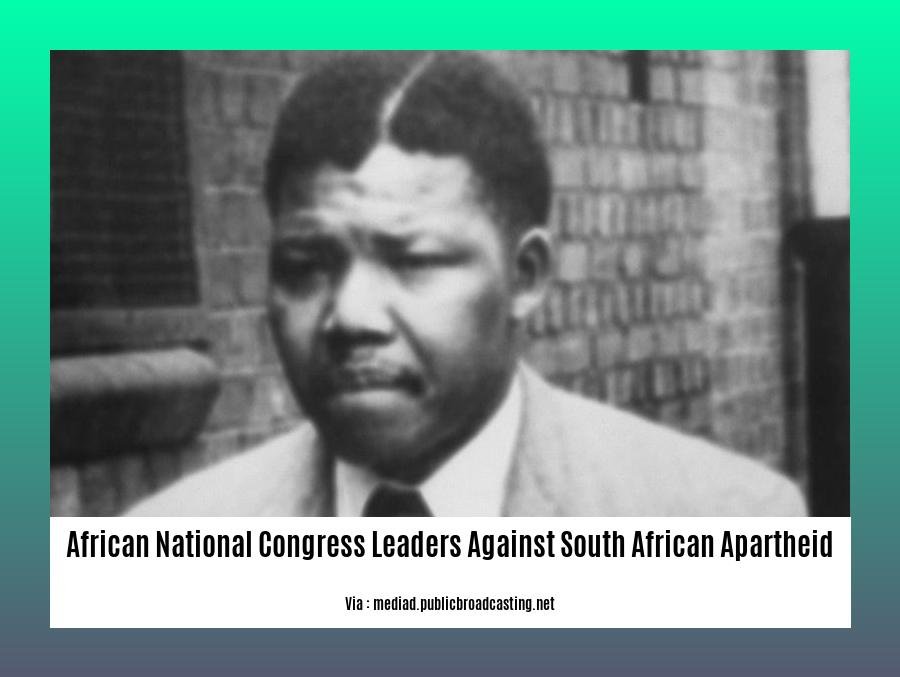In this article, “African National Congress Leaders Against South African Apartheid: A Study of Courage and Resistance,” we will delve into the lives and work of the extraordinary leaders who spearheaded the African National Congress (ANC) in their indomitable struggle against apartheid. We will explore their early lives, formative experiences, and the pivotal roles they played in organizing resistance, mobilizing mass movements, and negotiating a transformative era for South Africa.
Key Takeaways:

- Founded in 1912 to oppose apartheid.
- Early split over collaboration with communists.
- Banned in 1960, released from ban in 1990.
- Nelson Mandela, the first post-apartheid president, was a long-time leader.
- Established a military wing, uMkhonto we Sizwe.
- Current president is Cyril Ramaphosa.
African National Congress Leaders Against South African Apartheid
Amidst the oppressive grip of apartheid in South Africa, a courageous band of leaders emerged from the African National Congress (ANC). Their unwavering determination and strategic vision ignited a movement that would forever alter the course of history.
Early Struggles and Ideological Divisions
The ANC, founded in 1912, initially pursued nonviolent resistance. However, frustration grew as apartheid laws tightened. In the late 1920s, a rift emerged within the ANC over collaboration with the Communist Party.
Defiance and Repression
Under leaders like Albert Luthuli and Nelson Mandela, the ANC launched bold defiance campaigns. Protests were met with violent repression, and in 1960, the organization was outlawed. Its leaders faced imprisonment, torture, and exile.
Armed Resistance and International Diplomacy
Forced underground, the ANC formed the military wing, uMkhonto we Sizwe, to fight apartheid. Simultaneously, ANC leaders like Oliver Tambo and Thabo Mbeki tirelessly lobbied for international support.
Negotiations and Transition
After decades of struggle, political reforms led to the release of ANC leaders and the unbanning of the organization in 1990. Nelson Mandela became the first democratically elected president of a post-apartheid South Africa.
Legacy of Leadership and Resistance
The ANC leaders against South African apartheid embodied courage, resilience, and unwavering belief in their cause. Through their sacrifices and strategic vision, they dismantled a heinous system and ushered in a new era of freedom and equality. Their legacy continues to inspire generations to fight against injustice and strive for a better future.
Learn about the legendary ANC leaders who fought apartheid and their tireless efforts. Discover the iconic voices against South African oppression and their powerful messages. Be inspired by the heroes of the anti-apartheid struggle and their unwavering determination.
Early life and work
The early life and work of the African National Congress (ANC) leaders against South African apartheid is a fascinating and inspiring story. These leaders, who dedicated their lives to fighting against the oppressive system of apartheid, came from diverse backgrounds and played a vital role in shaping the ANC’s strategies and goals.
One of the most important figures in the early ANC was John Dube. Born in 1871, Dube was a minister and educator who became the ANC’s first president in 1912. He was a strong advocate for black nationalism and believed that the ANC should be a non-racial organization. He played a key role in organizing the ANC’s first national conference in 1912 and helped to draft the organization’s constitution.
Another early ANC leader was Pixley ka Isaka Seme. Born in 1881, Seme was a lawyer and journalist who became the ANC’s second president in 1917. He was a strong advocate for black self-determination and believed that the ANC should be an independent organization. He led the ANC’s delegation to the Versailles Peace Conference in 1919, where he presented a petition calling for an end to colonialism and racial discrimination.
Key Takeaways:
- The ANC was founded in 1912 as the South African Native National Congress.
- John Dube was the ANC’s first president and a strong advocate for black nationalism.
- Pixley ka Isaka Seme was the ANC’s second president and a strong advocate for black self-determination.
Most Relevant URL Source:
Early opposition to apartheid
Early opposition to apartheid is a topic that has been studied extensively by historians. The African National Congress (ANC) was founded in 1912, and one of its primary goals was to fight against the system of apartheid. The ANC used a variety of methods to oppose apartheid, including protests, boycotts, and strikes.
The ANC’s early leaders were some of the most courageous and influential figures in the fight against apartheid. These leaders included Nelson Mandela, Oliver Tambo, and Walter Sisulu. They were willing to risk their lives to fight for what they believed in, and their efforts helped to lay the foundation for the eventual end of apartheid.
The ANC’s early opposition to apartheid was met with fierce resistance from the South African government. The government used violence and intimidation to try to stop the ANC, but the ANC refused to be silenced. The ANC’s continued resistance helped to raise awareness of apartheid around the world, and it played a major role in the eventual end of the system.
Key Takeaways:
- The African National Congress (ANC) was founded in 1912 to fight against apartheid.
- The ANC’s early leaders were some of the most courageous and influential figures in the fight against apartheid.
- The ANC used a variety of methods to oppose apartheid, including protests, boycotts, and strikes.
- The ANC’s early opposition to apartheid was met with fierce resistance from the South African government.
- The ANC’s continued resistance helped to raise awareness of apartheid around the world, and it played a major role in the eventual end of the system.
Most Relevant URL Source:

FAQ
Q1: Who were some of the key ANC leaders during the apartheid era?
Q2: What were the early lives and work of these ANC leaders?
Q3: How did these leaders initially oppose apartheid?
Q4: What were the challenges and obstacles faced by the ANC leaders in their fight against apartheid?
Q5: How did the ANC leaders contribute to the eventual end of apartheid in South Africa?
- Unlock Elemental 2 Secrets: Actionable Insights Now - April 2, 2025
- Lot’s Wife’s Name: Unveiling the Mystery of Sodom’s Fall - April 2, 2025
- Photocell Sensors: A Complete Guide for Selection and Implementation - April 2, 2025
















